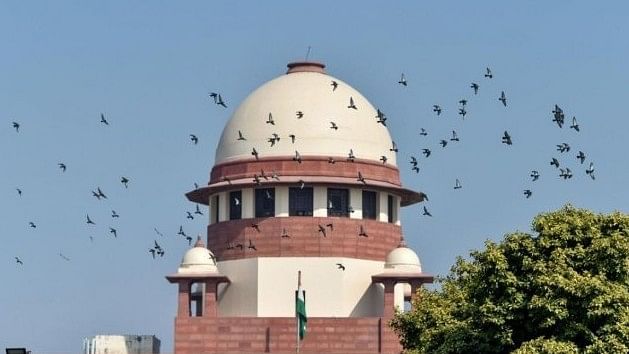
Supreme Court of India.
Credit: PTI File Photo
The Supreme Court said the principle of irretrievable breakdown of marriage cannot used invariably to dissolve the marriage between the parties in a contested divorce proceeding, without recording a finding of cruelty on the part of a spouse.
A bench of Justices Aniruddha Bose and Bela M Trivedi set aside a Madras High Court's order dissolving the marriage of a couple.
The High Court has relied upon the principle of irretrievable breakdown of marriage to grant decree of divorce. It had said the couple had been living separately for 12 years and forcing them to continue their relationship would mean prolonging their agony.
"We are of the opinion that the High Court has committed error of law by relying on the principle of irretrievable breakdown of marriage to dissolve the marriage between the parties in a contested divorce proceeding. The High Court, however, did not return any finding on allegations of cruelty on the part of the wife, on which the Family Court came to a specific conclusion," the bench said.
The bench said a finding on the aspect of cruelty is necessary for proper adjudication of the appeals while setting aside the judgment of the High Court, to the extent it decreed divorce by dissolving the marriage between the parties.
The bench sent back the appeal to the High Court for fresh hearing.
In the case at hand, acting upon a plea by the man, a family court at Erode passed an order for judicial separation instead of decree of divorce.
The family court concluded findings certain acts of the wife came within the “purview of cruelty.”
The husband and wife filed appeals against the order before the High Court, which by a common judgment of March 23, 2022 dissolved the marriage.
The husband said the decree of divorce ought to have been granted upon findings of cruelty. The wife, however, challenged order of judicial separation.
In its order, the bench found that the High Court has applied the principle of irretrievable breakdown of marriage to grant decree of divorce by dissolving the marriage between the parties.
"The High Court has dealt with the evidence in detail but there is no finding that cruelty was meted out by the appellant-wife to the respondent-husband. That aspect of the judgment of the Family Court was not addressed to in the judgment under appeal," the bench said.
The High Court, in its order, had noted that the parties are living separately for more than 12 years.
"The endeavour to bring re-conciliation between the parties failed, resultantly, the marriage is dead, both emotionally and practically. Continuance of the relationship for namesake is prolonging the agony and affliction would be a cruelty to both the parties. Therefore, we are of the considered opinion that the marriage between the parties has broken down irretrievably and the parties could no longer live together as husband and wife," it had said.
The Supreme Court's Constitution bench had on May 1 in its judgement had declared that it can use its extraordinary power under Article 142 (1) of the Constitution to dissolve those marriages, which are irretrievably broken down, by dispensing with the procedure and waiting period prescribed under the Hindu Marriage Act.
